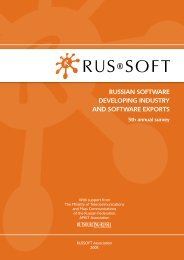russian software developing industry and software exports
russian software developing industry and software exports
russian software developing industry and software exports
Create successful ePaper yourself
Turn your PDF publications into a flip-book with our unique Google optimized e-Paper software.
Chapter 4.<br />
AVAILABILITY OF UP-TO-DATE<br />
INFRASTRUCTURE<br />
Based on the results of the poll, the IT infrastructure<br />
has significantly improved over the last year. The share<br />
of «poor» evaluations decreased from 52% to 20%<br />
while «good» increased from 6% to 21%. Indeed,<br />
in 2008 certain positive changes were observed:<br />
the launch of new business centers (performed<br />
with varying degrees of intensity), investments<br />
made in special economic zones, technology parks,<br />
state corporations, roads maintenance, expansion<br />
of communication channels <strong>and</strong> construction of<br />
the elements of the system of power supply <strong>and</strong><br />
distribution.<br />
Such gradual improvements were registered in<br />
the previous years as well, but the results of the poll<br />
showed that in the best case business saw just little<br />
progress. Last year’s evaluations were similar to the<br />
previous year. It may be assumed that a consistent<br />
growth in the volume of investment in infrastructure<br />
at a certain point led to qualitative changes in their<br />
evaluation by business.<br />
Another essential achievement is the changes in<br />
the market of Internet access services, mainly in the<br />
big cities. The speed of traffic has hugely increase<br />
followed by the reduction in tariffs. The year before<br />
the crisis leading providers were completing their<br />
networks in major cities.<br />
The crisis produced a major impact on the<br />
reduction of rental costs for office premises. The lease<br />
of premises is the second major item of expenditure<br />
(after salaries) for <strong>software</strong> companies. Moreover,<br />
lease rates in major Russian cities were 2-3 times<br />
higher than in business centers in Western Europe.<br />
The growth in dem<strong>and</strong> for quality office premises<br />
was lagging behind the launch into operation of new<br />
buildings. As a consequence of the crisis the dem<strong>and</strong><br />
for the lease of office premises sharply decreased<br />
followed by the reduction in prices. For instance,<br />
in Moscow the lease of an office of medium quality<br />
dropped approximately 4 times. The reduction in<br />
prices is not equal all over Russia, but it is significant<br />
anyway.<br />
The reaction of respondents to reduced lease rates<br />
proves that dissatisfaction of <strong>software</strong> companies<br />
with the state of infrastructure is probably has to do<br />
with the quality of the latter, rather than the cost of<br />
services required to maintain this infrastructure.<br />
Companies could get the services of the required<br />
quality already long ago. But previously they were<br />
irritated <strong>and</strong> displeased with their cost (especially as<br />
far as the lease of offices is concerned). The level<br />
of this dissatisfaction could be measured owing<br />
to the crisis.<br />
A major reduction in «poor» evaluations was<br />
recorded for all companies in spite of their location,<br />
turnover <strong>and</strong> revenue structure. For all groups the<br />
share of «poor» marks radically decreased <strong>and</strong> stays<br />
within 13-25%. We can mention a slightly bigger<br />
proportion of «good» marks for St. Petersburg<br />
companies as well as companies with the turnover<br />
more than 20 MUSD, but these deviations may<br />
be caused by hopes for improvement related to<br />
intentions or actions of the State to create special<br />
economic zones. For example, last year there were<br />
more «poor» evaluations of infrastructure made by<br />
St. Petersburg companies than by representatives<br />
of other cities. During the year there were major<br />
developments in infrastructure that could have<br />
promoted the North capital from the last to the<br />
first place by infrastructure conditions to exclude<br />
the emotional reaction to the information about the<br />
implementation of projects of the special economic<br />
zone <strong>and</strong> the Technology park.<br />
The crisis made the Government change its attitude<br />
to those investors who stayed in the city after the<br />
crisis. Thus, the management of the Finnish company<br />
Technopolis is now confident that the first phase of<br />
their Technology park will be launched into operation<br />
in Q2 2010. Its total area will be 23,800 sq. m, <strong>and</strong> the<br />
area of premises leased – 18,000 sq. m. Technopolis<br />
considers an opportunity to build a network of<br />
Technology parks in Russia.<br />
The good news is the progress in the development<br />
of technical <strong>and</strong> innovation Special Economic Zones<br />
(SEZ). These include 4 zones in: St. Petersburg,<br />
Zelenograd (this city has a status of a Moscow district),<br />
Dubna (Moscow region) <strong>and</strong> Tomsk. Infrastructure<br />
facilities <strong>and</strong> administrative buildings are under<br />
construction, <strong>and</strong> companies are granted the status<br />
of residents (therefore, they may build their facilities<br />
<strong>and</strong> enjoy the rights of residents <strong>and</strong> tax privileges).<br />
60%<br />
50%<br />
40%<br />
30%<br />
20%<br />
10%<br />
0%<br />
Overview of Business Environment<br />
for Software Development in Russia<br />
52%<br />
Poor<br />
Evaluation of existing infrastructure<br />
42%<br />
2008<br />
6%<br />
20%<br />
Satisfactory<br />
60%<br />
2009<br />
21%<br />
Good<br />
FINANCIAL SUPPORT TO SMALL<br />
BUSINESSES AND START-UPS.<br />
INVESTMENT FUNDS<br />
For 2/3 of respondents financial support of small<br />
business <strong>and</strong> start-ups is insignificant or almost nonexistent.<br />
The results of the poll concerning this type<br />
of support practically remained the same in the past<br />
34








